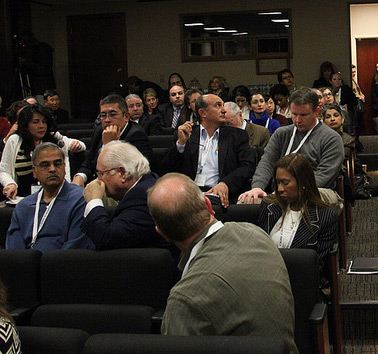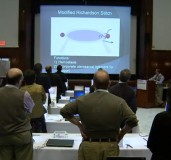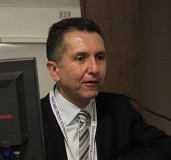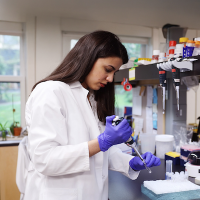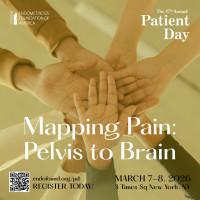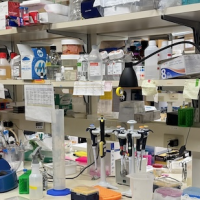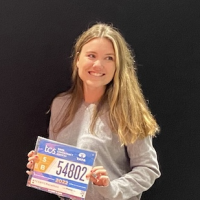Endometriosis Foundation of America
Endometriosis 2013 / Endometriosis Video Lectures - Q&A
Serdar Bulun, MD; Tamer Seckin, MD, Harry Reich, MD & Dan Martin, MD
Audience Member: When I was reviewing endometriosis, and if you operate on a patient to the point where you remove her ovaries and uterus, the feeling is initially that we should not replace hormones in the patient very soon. Now it seems that the current thinking is that we can replace them prior to them becoming symptomatic. So my question is, do you agree with that statement and then I have another question about birth control as well.
Serdar Bulun, MD: There are not enough data to make a firm recommendation. I personally see a lot of women just because of referrals who have so-called post-menopausal endometriosis. In other words, endometriosis grows in the pelvic area in the absence of any ovarian activity and most of the time these women have been treated with estrogen-only treatment. Because of that in my practice, at least for the first six months to a year, I add a progestin to estrogen for hormone replacement after LAVH.
Audience Member: But how so would you begin it? How soon would you start that after surgery?
Serdar Bulun, MD: Right away.
Audience Member: And then that leads up to the prior question which is if you are going to surgery, let us say it is LAVH, they recommend stopping birth control pills which the woman would be taking to present pain four weeks prior to surgery. For somebody who is obviously benefitting do you think that is still good advice? To prevent that - you are doing it to prevent the DVT associated risk.
Serdar Bulun, MD: I personally do not believe that stopping oral contraceptives four weeks before prevents DVT, we go all the way until surgery most of the time. And again, there are no good data one way or the other but I would rather not have the patient suffer through the pain during those four weeks.
Tamer Seckin, MD: Are there questions for this first presenter, let us say about the appearance of endometriosis?
Dan Martin, MD: One quick thing, what you said about hormone therapy. Because we still have large numbers of physicians in the United States, who get into trouble doing hysterectomies with endometriosis. They do not do what you saw today and that is go lateral, find healthy planes, sweep everything in between. So they try to go into it and they leave stuff behind. Sometimes they know they have left it behind. We still have surgeons who will do a supracervical hysterectomy but...part of the bowel. If you think you have left it behind, and if you know you have left it behind, remember, post-menopausal hormone therapy is estrogen and progestin or something that is not estrogen alone. You have to cover with estrogen and progesterone because you have essentially left many uteruses out there, little bitty baby uteruses all over the place that are waiting for full on... estrogen cause of cancer.
Tamer Seckin, MD: Are there any comments on this again? I personally, if the patient is on birth control pills, I let them go on for a while. But I do not routinely use birth controls pills after surgery because I like to test what the effect of the surgery is as to that person's concerns.
I just wanted, before any questions to Dr. Bulun, additional or any other speaker in the room about the bowels and bladders, Dr. Liu. I want to comment I think Dr. Reich's final video with respect to leaving the mucosa and repairing and with that complementing that part of surgery, staplers are a very important aspect. It is important to check the rectum with a contrast blue because you may be fooled because these are sometimes repetitive surgeries. The mucosa does not give its true weakness to you. If it is transparent, too blue, you need to repair the defect with either suture or stapler. That is very important.
The second thing is on bladder. We learned today bladders are forgiving. The ureter is forgiving but do not forget the issue of maybe at times leaving the stent longer if you have used stake stents you can put double Js later. They may have a protective effect if you have thermal injuries that you cannot calculate. I will show you a video of this tomorrow.
Well, I guess we are coming to the end of this session also. It is important again, let me emphasize the quality of surgery; improving the quality of surgery is the call that we have to pursue in endometriosis surgery and as endometriotic surgeons we are. The learning curve of these surgeries is very long, sometimes longer than the life is spent to learn these surgeries. The purpose of these meetings is to shorten that time by seeing what Dr. Martin has told you and showed you in the morning, recognizing the importance. I am not sure whether robots really diagnose the endometriosis by its view any better, but I do accept robotic advantages in many cases. But there is also this uniqueness of the robot that you are away from the patient you really lose your touch and feel senses. People who do suturing surgery do not need to resort to robot and give up to the robot their whole command of the case that easily.
I am hoping that you benefitted from this morning's session. Dr. Reich, go ahead.
Harry Reich, MD: Somewhere yesterday and today - yesterday we learned that women should at age 25 freeze their eggs. If we combined the same birth control pills all the rest of the time except for that year and freeze their eggs.
Tamer Seckin, MD: Does anybody want to make a final comment? Newcomers?
Audience Member: One other question, do you believe in any preoperative hormone level testing prior in case they do go on hormones afterwards? Is that helpful or do you just go with symptoms? I have been thinking about that lately, prior to surgery should we just see what their levels are? That includes testosterone, estradiol and progesterone. Thank you.
Serdar Bulun, MD: I do not because as you know when we measure the hormones you take blood from the arm. Most of the events, inflammation that occurs endometriosis is local. We do not have any means of detecting it through testing. I just do not. To me the history of the patient is much more valuable than hormonal testing.
C.Y. Lui, MD: Just one more question. I just want to make a comment about bowel endometriosis. Bowel endometriosis sometimes, actually it is not sometimes, a lot of times, it is a multi-focal. Okay, not only one nodule. Sometimes there are several nodules. In that case do not bother to do piecemeal work, that kind of patient needs a segmental resection. That is very important, otherwise keep on take one here, take one there and suture. A lot of time you are going to miss one or two. Then the patient will have a problem and will come back.
Just one more question here.
Audience Member: Can you please just talk about Danazol and aromatase inhibitors? How long do you suggest you keep somebody on those if you are getting some effect and relief?
Serdar Bulun, MD: I think Danazol is a very good drug to treat endometriosis. It is just that a lot of patients will refuse to take it because of its potential side effects. I mean, there is nothing wrong with Danazol.
Aromatase inhibitors - it depends. I usually start with an intention of treating the patient for six months and then I sit down and speak with the patient. I usually do what the patient wants. The patient sort of determines how long she will have the treatment based on the risk/benefit ratio, unless if they want something crazy, I go along with it.
Audience Member: How do you feel about...there is some talk that it is a better medical treatment than Danazol or some of the companies are in some other places in Europe and maybe in Egypt. For example they are talking about...that this would be the future.
Serdar Bulun, MD: I really do have any particular experience with that medication but in my opinion just oral contraceptives with an appropriate dose is as good as anything. I think it provides the least side effects and maximizes the benefits to the patient without causing a lot of risks.
Tamer Seckin, MD: Okay, so I will invite you - any more question before I close?
Audience Member: What is your experience with the Mirena IUD? Obviously there are more and more reports that the Mirena IUD causes atrophy of endometrium and you can preserve the fertility in patient who are younger who are interested in future fertility.
Serdar Bulun, MD: I guess suppressing eutopic endometrium either the IUD or even ablation does not seem to work for a reason, at least in my practice. Again, there are all sorts of reports out there I acknowledge all of them. I personally do not believe that it works but I could be wrong.
Dan Martin, MD: It looks like we have got two populations of patients, those who seek primary care physicians with moderate and severe endometriosis, and those patients that come to see us.
The ones in primary care practices with moderate to severe dysmenorrhea look like they get excellent results. If some of those women have early endometriosis and you are keeping them from becoming more symptomatic, it may be a wonderful thing. But if all your patients are referral patients who come into you with pelvic pain my experience is putting a Mirena in them causes more pain than it does any good.
Tamer Seckin, MD: I guess this could be it but anymore, Ted do you want to comment on anything?
Ted Lee, MD: I think we have had a lot of good speakers today. I think many of them all bring different perspectives on endometriosis. I learned a lot. Dan's lecture was excellent; I have read all his books. It has been great.
Harry Reich, MD: Does anyone have any experience with virtual colonoscopy, the 64 slice cat-scans for the diagnosis of really being able to see what is going on with the whole rectum? There are some studies coming out of France and South Africa using that technology.
Ted Lee, MD: Actually I showed the papers to our radiologists and they laughed at me. Yes, because I thought it was very different. The South African studies, you know that was probably the...
Harry Reich, MD: Did you present it to North Shore Hospital...radiologists to try to get them to consider it?
Ted Lee, MD: They told us more radiation and so. But I looked at it; some of his videos and some of his presentations and it is very promising. I think a lot of times with endometriosis surgery the more you know about the extent of the surgery the better it is because you can counsel the patient before as to what to expect, after all endometriosis surgery is benign surgery. It is not like cancer surgery so a lot of patients expect good outcomes. But at the same time the surgery itself is associated with a lot of complications sometimes. If you do not really carefully discuss all the different possibilities with the patient ahead of time medical-legally it is pretty hard to do. Once you have explained to the patient what needs to be done and what are the implications of the surgery it allows you to perform it at your best because you are not worried, you are not second guessing as well about what the patient wants, you are not sure. Once you know lay out the paper with the page and then people know what to expect. You can unleash your skill on the patients with a lot of freedom. That is my opinion.
Harry Reich, MD: What about ultrasound? I have seen Mauricio Abrao, the radiologist in Brazil who goes to the office. The [rectal]? ultrasound exam is at least a one hour exam and it maps everything out. It was beautiful to see as far as... Well, you were there.
Tamer Seckin, MD: I will give the microphone to my esteemed colleague and friend from Puerto Rico, Dr. Salgado.
Juan Salgado Morales, MD: Yes, we have been doing that since 2009. It has worked very, very well. We do bowel direct and very predictive. As you said we can tell patients exactly what we are going to do, what we are going to find, if they are going out with a Foley or if they are going to have a resection. It is not a surprise at the surgery. If you do it prior, you prepare a map. We do what we call a...sonography, which is like a prediction, a score prediction for the surgery. If I get an obgyn sending a patient and it is a high TOSS I say, "Do you want to do the surgery? We could do it if you don't feel comfortable, we do the surgery for you". We return the patient. But it works very, well, very well.
Tamer Seckin, MD: Again, thank you very much. I want to particularly thank the support of Lenox Hill Hospital and my department and its senior members, Dr. ..., thank you very much. Dr. Chang, Dr. ChinQuee thank you very much. My ex-residents, some of my fellows, Dr. ...I want to thank you. Dr. Michael Lewis who I know from Methodist Hospital was my resident. Dr. Orbuch, thank you for being here, I acknowledge your input, thanks. Thank you very much Dr. Tomar. Thank you very much.
Have a great lunch and for those who want to improve their skills with suturing, remember, if you cannot suture you cannot do these surgeries.



